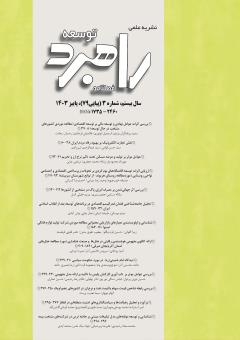ارزیابی اثرات توسعه اقامتگاههای بوم گردی بر تحولات زیرساختی، اقتصادی و اجتماعی نواحی روستایی (موردمطالعه روستای هریوند- از توابع شهرستان سربیشه)
محورهای موضوعی :صدیقه خوب چهره 1 , وحید رضا میرابی 2 , احمدرضا کسرائی 3
1 - دانشجوی دکتری مدیریت کار آفرینی گرایش بین الملل ، واحد تهران مرکزی، دانشگاه آزاد اسلامی، تهران، ایران.
2 - دانشیار گروه مدیریت بازرگانی ، تهران مرکزی دانشگاه آزاد اسلامی، تهران ، ایران . (نویسنده مسئول)
3 - استادیار گروه کسب و کار و کار آفرینی ، واحد تهران مرکزی ، دانشگاه آزاد اسلامی ، تهران ، ایران.
کلید واژه: کلیدواژه : توسعه اقامتگاه , تحولات زیرساختی , گردشگری, اقتصادی,
چکیده مقاله :
توسعه اقامتگاههای بوم گردی در مناطق روستایی میتواند تأثیرات بسیار مثبتی بر تحولات زیرساختی اقتصادی و اجتماعی نواحی روستایی داشته باشد. این توسعه میتواند منجر به ایجاد فرصتهای شغلی جدید، رشد اقتصادی، توسعه بینالمللی، افزایش درآمد محلی و تقویت زیرساختهای اجتماعی و فرهنگی شود با توجه به وضعیت فرهنگی ، اقتصادی و اجتماعی روستای مذکور و رونق کسبوکارهای بومی و محلی ، صنایعدستی با شهرت جهانی و ثبت به عنوان روستای جهانی حوله بافی سنتی و تقاضا برای فعالیتهای بوم گردی این روستا هدف پژوهش قرار گرفت ؛ این پژوهش از نوع کاربردی و به روش توصیفی - تحلیلی مبتنی بر پرسشنامه است. واحد تحلیل در این پژوهش، فرد روستایی است و جامعه آماری پژوهش حاضر را ساکنین روستای هریوند در سال 1400 تشکیل داده است . پس از تهیه ، توزیع و تکمیل پرسشنامه و مصاحبه با مردم روستای منطقة بررسیشده و تجزیهوتحلیل دادهها مشخص شد که ایجاد اقامتگاههای بوم گردی در سکونتگاههای روستایی در تحولات زیرساختی، اقتصادی و اجتماعی و همچنین برجذب گردشگر در روستا مؤثر است. در آزمون فرضیههای فرعی مشخص شد ایجاد اقامتگاههای بوم گردی در سکونتگاههای روستایی در تحولات زیرساختی ازجمله: بهبود وضعیت بهداشتی معابر اصلی روستا و معابر مرتبط با اقامتگاه، بهبود وضعیت ارتباطات بهویژه آنتن دهی موبایل ، ایجاد انگیزه در برخی بومیان محلی و بومیان ساکن در شهر بهمنظور بهسازی زیرساختی منازل مسکونی و فعالیت درزمینهٔ بوم گردی و در تحولات اقتصادی ازجمله: کسب درآمد بهرهبردار، ایجاد اشتغال مستقیم و غیرمستقیم، رونق مشاغل خانگی (انواع رشتههای صنایعدستی مانند حوله بافی و تولید نان خانگی )، آشپزی، فعالیت گروههای موسیقی محلی، حملونقل ، اخذ تسهیلات بانکی و همچنین در تحولات اجتماعی ازجمله: احیاء آدابورسوم ( آیینهای شاخص )، ترویج لباس محلی، هویت بخشی به روستا و احساس غرور، تقویت اعتمادبهنفس و باور تواناییهای بومی، تحکیم وحدت اهالی روستا، توجه به خانههای تاریخی و نگهداری و احیاء آنها، حضور نخبگان در روستا و تعامل با مردم و ارتقای امنیت روستا مؤثر است.
Sadigheh khoobchehreh Vahid Reza Mirabi Ahmadreza Kasraee Abstract The development of ecotourism residences in rural areas can have very positive effects on the economic and social infrastructure developments of rural areas. This development can lead to the creation of new job opportunities, economic growth, international development, increase in local income and strengthening of social and cultural infrastructure, considering the cultural, economic and social situation of the said village and the prosperity of native and local businesses, handicrafts with The world fame and registration as a world village of traditional towel weaving and the demand for eco-tourism activities of this village were the targets of the research; This research is applied and descriptive-analytical based on a questionnaire. The unit of analysis in this research is a villager, and the statistical population of the current research is made up of the residents of Harivand village in 1400. After preparing, distributing and completing the questionnaire and interviewing the people of the village in the investigated area and analyzing the data, it was found that the creation of ecotourism residences in rural settlements is effective in infrastructure, economic and social developments, as well as in attracting tourists in the village. In the test of the sub-hypotheses, it was found that the creation of eco-tourism residences in rural settlements in infrastructure developments, including: improving the health condition of the main roads of the village and the roads related to the residence, improving the condition of communications, especially mobile antennas, motivating some local natives and natives living in the city in order to improve the infrastructure of residential houses and activities in the field of eco-tourism and in economic developments such as: earning profitable income, creating direct and indirect employment, promoting home businesses (types of handicrafts such as towel weaving and bread production household), cooking, activities of local music groups, transportation, obtaining bank facilities and also in social developments, including: revival of customs (indicative rituals), promotion of local dress, giving identity to the village and sense of pride, strengthening trust It is effective to strengthen the unity of the village residents, pay attention to historical houses and maintain and revive them, the presence of elites in the village and interaction with the people and improve the security of the village.
